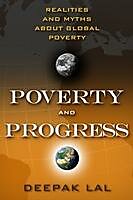In his new book, Poverty and Progress: Realities and Myths about Global Poverty, renowned development economist Deepak Lal draws on 50 years of experience around the globe to describe developing-country realities and rectify misguided notions about economic progress.
Part One of Poverty and Progress assesses poor-country realities by tracking growth through globalization, the rapid rate of change in standard-of-living indicators over the last half century, and in how political economy affects economic growth rates in developing countries. In Part Two, Lal examines the myths and confusion about poor countries, including calculations that exaggerate the extent of poverty; overstated claims made on behalf of microfinance; the resurrection of discredited theories, such as vicious circles of poverty; and the need for massive foreign aid to save Africa.
Unique among books that have emerged in recent years on world poverty, Poverty and Progress directly confronts intellectual fads of the West and dismantles a wide range of myths that have obscured an astounding achievement: the unprecedented spread of economic progress around the world that is eliminating the scourge of mass poverty.
